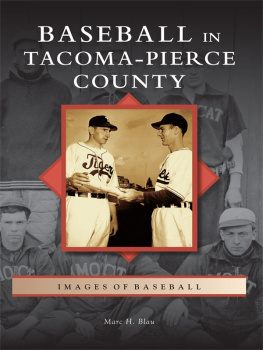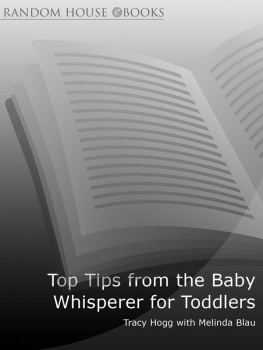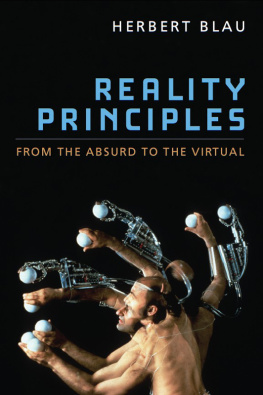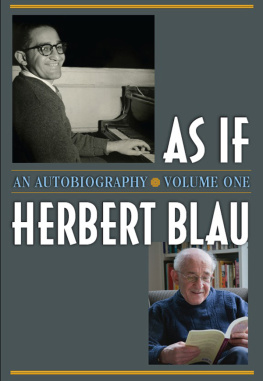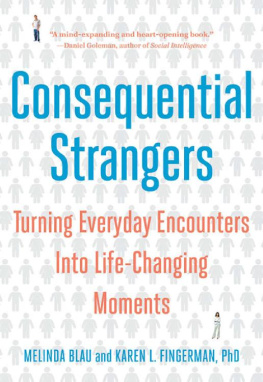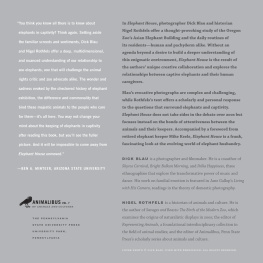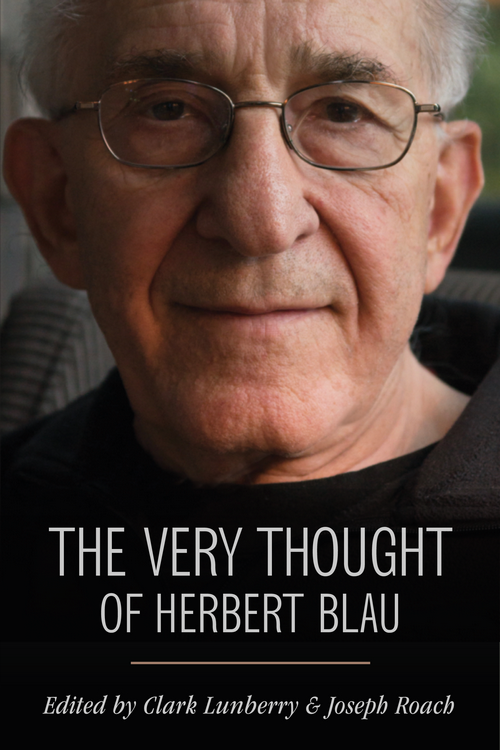
The Very Thought of Herbert Blau
The Very Thought of Herbert Blau
Clark Lunberry and Joseph Roach, Editors
University of Michigan Press
Ann Arbor
Copyright 2018 by Clark Lunberry and Joseph Roach
All rights reserved
This book may not be reproduced, in whole or in part, including illustrations, in any form (beyond that copying permitted by Sections 107 and 108 of the U.S. Copyright Law and except by reviewers for the public press), without written permission from the publisher.
Published in the United States of America by the
University of Michigan Press
Manufactured in the United States of America
A CIP catalog record for this book is available from the British Library.
Library of Congress Cataloging-in-Publication data has been applied for.
ISBN 978-0-472-13092-4 (hardcover : alk. paper)
ISBN 978-0-472-12408-4 (e-book)
Frontispiece: Herbert Blau, 2012. Photo by Dick Blau.
Contents
Clark Lunberry
Lee Breuer
Sue-Ellen Case
Elin Diamond
S. E. Gontarski
Linda Gregerson
Julia Jarcho and Martin Harries
Bill Irwin
Anthony Kubiak
Daniel Listoe
Bonnie Marranca and Gautam Dasgupta
Bonnie Marranca
Peggy Phelan
Joseph Roach
Richard Schechner
Morton Subotnick
Julie Taymor
Gregory Whitehead
Portions of this book appeared in somewhat different form in Performance and History: What History? Essays in Honor of Herbert Blau, a special issue of Modern Language Quarterly 70.1 (2009). The editors also wish to acknowledge Performing Arts Journal for permission to reprint Bonnie Marranca and Gautam Dasguptas The Play of Thought: An Interview with Herbert Blau. Portions of Elin Diamonds essay were adapted from Re: Blau, Beckett, and the Politics of Seeming, The Drama Review (TDR) 44.4 (Winter 2000): 3143; and In Memory [of Herbert Blau], The Drama Review (TDR) 57.4 (2013): 89.
- 1964 The Impossible Theater: A Manifesto [Impossible]
- 1982 Blooded Thought: Occasions of Theater [Blooded]
- 1982 Take Up the Bodies: Theater at the Vanishing Point [Take Up]
- 1987 The Eye of Prey: Subversions of the Postmodern [Eye]
- 1990 The Audience [Audience]
- 1992 To All Appearances: Ideology and Performance [Appearances]
- 1999 Nothing in Itself: Complexions of Fashion [Nothing]
- 2000Sails of the Herring Fleet: Essays on Beckett [Sails]
- 2002 The Dubious Spectacle: Extremities of Theater, 19762000 [Dubious]
- 2011 Reality Principles: From the Absurd to the Virtual [Reality]
- 2011 As If: An Autobiography [As If]
- 2013 Programming Theater History [Programming]
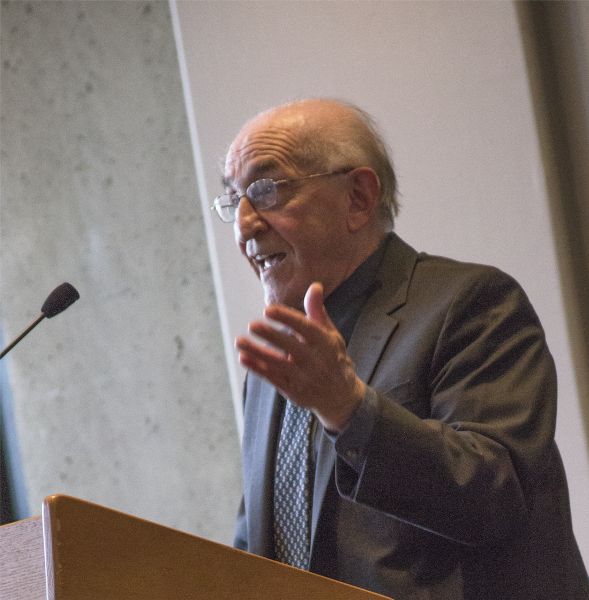
Clark Lunberry
In truth, the mark of a prelate is not mildness or unction, but the most rigorous intelligence. Our heart is our undoing.
The Bishop, in Jean Genets The Balcony
What we see of behavior is always subject to doubt, or as if a curtain were always rising on our experience. Or falling.
Herbert Blau, The Audience
Herbert Blau spent his entire professional life, as both a theater director and theoretician of theater, striving to realize something of the impossible play of appearance and disappearance that he believed the theater might theoretically, thoughtfully offer, those moments when you are precipitously about to see something which, in the very activity of perception, disappears, as if in fact exhausted in the energy required for you to see it (Sails, 153). Of such an acute (exhausting) perception, one in which the idea of disappearance is engrailed in the very nature of theater.... Now you see it now you dont (Blooded, 27), Blau describes in one of his later books a stormy encounter from his early days as a director, and of an actors lament with his rehearsed role, I dont feel this, Im not feeling this at all, the actor said. To which Blau vehemently replied, I couldnt care less what you feel, or dont, feelings are cheap! I only care what you think. What were doing here is thinking, trying to understand (Reality, 143). In a later chapter of that same book entitled The Emotional Memory of Directing, Blau is looking back from a distance of decades onto memories of emotions always directed toward theaters own unique vantage onto thought, its corporeal manifestations, its bodily obligations, and, as he repeatedly affirmed, the ontological fact that the one performing... is dying in front of your eyes (Reality, 114).
The fact of this witnessed dying, the very thought of it, was notcontrary to what one might gather from Blaus forceful reaction to his struggling actoran unfeeling or uncaring one but instead a carefully directed response that was to demand of actors, audiences, students, and readers alike the rigors of reflection, a not so cheap cost to the concentration, the kind of thinking, the trying to understand, that Blau always insisted on. For, as he affirmed again and again, it is the nature of that thought, as embodied object, as imperiled subject, that Blau most strenuously and consistently sought and engaged throughout his long life. Moving as he did with such compelling effectiveness between a myriad of materials (among so many others, Beckett to Shakespeare, Artaud to The Oresteia, or from a keen awareness of the tortuous movements of history to the days own raging headlines), it was always the illusiveness of thought, its very uncertainty, perhaps even its impossibility, that was returned to in his work, with Blau having dared to imagine and confront Artauds own terrifying, tragic proclamation that no matter which way you turn your head, you have not even started to think (Artaud 48).
Blaus own writing and analysis, turning as they always did every which way (and then some), were a forceful and vigilant manifestation of such a starting point, of such a desire to start thought. For it was, for Blau, at such primordial beginnings that the emotional memory of thoughts rigorous and violent approach was written on the bodies of those performing as thoughts corporeal condition of possibility, and which as always remains to be seen (Reality, 148).
What Blau would ask of his actors, his audience, and his many students he would also ask of his readers: to think at the extremity of thought (Reality, 67) of a theater that, like Hamms handkerchief in Becketts Endgame, was blooded with nothing but thought (Blooded, xx). Emerging within that effervescent tension between the appearance of reality and the reality of appearance, perception itselfalways subject to doubtmight then rise (and fall) like a curtain. There, at that occluded sight of the divided eye (at the razors edge of Luis Buuels open eyeball, to which Blau often alluded), something of the substance of thought itself is finally approached and entered into and where, as if on a stage, life (and death) become illuminated, history happens, and theater thinks, but where nothing of this can be seen until thought (34). For, as Marcel Prousts narrator, grieving for his grandmother, similarly asserts of thoughts necessity for perception to shape into knowledge, [W]e truly know only what we are obliged to re-create by thought, what everyday life keeps hidden from us (168). And what is Prousts obliged re-creation by thought but the form of thinking-as-theater that Blau demanded, a making visible of the otherwise hidden in order for it to be truly know[n].
Next page


